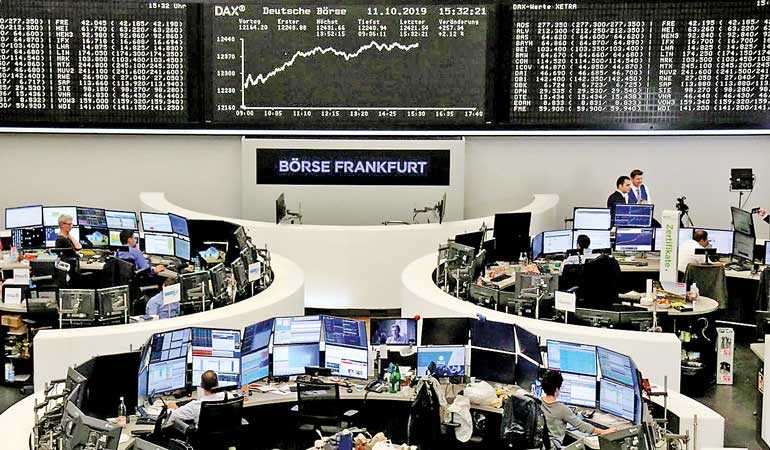Monday Feb 23, 2026
Monday Feb 23, 2026
Wednesday, 16 October 2019 00:12 - - {{hitsCtrl.values.hits}}

The German share price index DAX graph is pictured at the stock exchange in Frankfurt, Germany, 14 October – Reuters
LONDON (Reuters): Global stocks edged higher on Tuesday yet safe havens were still in play as markets tried to balance fading optimism over the latest China-US trade truce with the likelihood of a Brexit deal by Thursday’s European Union summit.
MSCI’s gauge of stocks across the globe gained 0.2% with European stocks climbing briefly to a two-week high after comments from the European Union’s chief Brexit negotiator that a deal with Britain over the terms of their divorce was still possible this week.
The pan-European STOXX 600 added 0.2% with France’s CAC and Germany’s export-oriented DAX both rising while Britain’s FTSE was a touch lower as sterling rose against the dollar and the euro, reflecting the cautious optimism about talks between Britain and the EU.
Yet capping broader gains in equities was a perceived lack of progress coming out of US-China trade negotiations.
Reports of a “Phase 1” trade deal between the United States and China last week had earlier cheered markets but the dearth of details around the agreement has since curbed this enthusiasm with oil prices extending declines, Chinese stocks weaker and the safe-haven yen holding gains versus dollar.
“Not enough was achieved to alter meaningfully the fundamental global economic outlook,” said Mark Haefele, chief investment officer at UBS Global Wealth Management.
“Global growth is still slowing and is below trend ... There is still scope for earnings disappointment and the remaining uncertainty from trade tensions means business investment is unlikely to improve markedly.”
Asian shares had nudged slightly higher while Japan’s Nikkei stock index was up 1.9%. US stock futures rose 0.5% after the S&P 500 ended 0.14% lower on Monday.
The focus is now firmly on Europe where officials from Britain and the EU will meet at a make-or-break summit on Thursday and Friday that will determine whether Britain is headed for a deal to leave the bloc on Oct. 31, a disorderly no-deal exit or a delay.
The main sticking point remains the border between EU member Ireland and Northern Ireland, which belongs to Britain. Some EU politicians have expressed guarded optimism that a deal can be reached.
However, diplomats from the EU have indicated they are pessimistic about British Prime Minister Boris Johnson’s proposed solution for the border and want more concessions.
Yet those concerns did little to quash market optimism for now, with Britain expected to make new proposals on Tuesday.
Euro zone bond yields inched up with Germany’s benchmark 10-year bond yield was 0.5 basis points higher on the day at -0.45%, flirting with a two-and-a-half month highs reached at the end of last week.
In the currency markets, optimism over a possible Brexit deal lifted sterling by as much as 0.7% to the dollar and approaching a three-month high of $1.2708 and climbing to a five-month high against the euro.
The yen, often considered a safe haven in times of economic uncertainty, held steady at 108.33 versus the dollar.
Markets were still considering the perceived lack of progress in resolving a prolonged trade row between the United States and China.
The United States agreed to delay an Oct. 15 increase in tariffs on Chinese goods while Beijing said it would buy as much as $50 billion of US agricultural products after tense negotiations last week.
However, Washington has left in place tariffs on hundreds of billions of dollars of Chinese goods.
Trade experts and China market analysts say the chances are high that Washington and Beijing will fail to agree on any specifics – as happened in May – in time for a mid-November meeting between US President Donald Trump and Chinese President Xi Jinping.
Chinese data also added to the woes. The latest numbers showed that China factory gate prices declined at the fastest pace in more than three years in September. That followed customs data on Monday that showed Chinese imports had contracted for a fifth straight month.
Concerns over the health of the global economy weighed heavily on oil prices, with US crude and Brent crude both falling around 1.5% to $52.75 and 58.48 per barrel respectively.
By early last week, hedge funds had become the most bearish toward petroleum prices since the start of the year, according to an analysis of position records published by the US Commodity Futures Trading Commission and ICE Futures Europe.